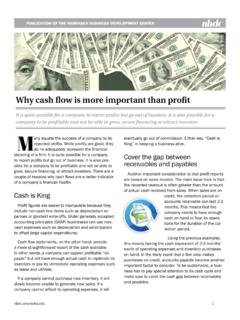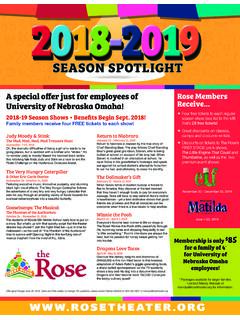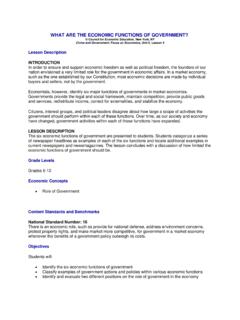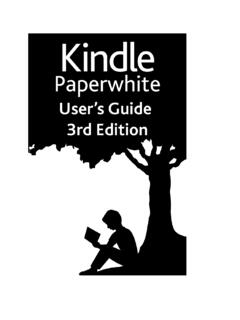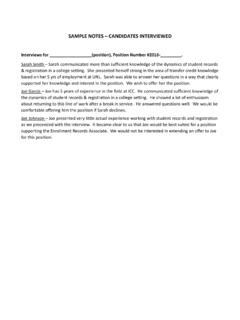Transcription of BUSINESS PLAN COVER PAGE - University of Nebraska …
1 BUSINESS plan COVER PAGE OWNERS Your BUSINESS Name Street Address City, State ZIP Code E-Mail | Telephone i Table of Contents EXECUTIVE SUMMARY .. 1 BUSINESS DESCRIPTION .. 2 Overview .. 2 Targeted Market & Customers .. 2 Growth Trends .. 2 Pricing Power .. 2 DESCRIPTION OF PRODUCTS/SERVICES .. 3 MARKET ANALYSIS .. 4 Market Research.. 4 Product.. 4 Competition.. 4 MARKETING STRATEGY .. 4 Customers.. 4 OPERATIONAL plan .. 6 Production.. 6 Location.. 6 Personnel.. 6 Suppliers.. 6 company STRUCTURE .. 7 Management Team.. 7 FUNDING REQUEST .. 8 FINANCIAL 9 Projected Cash Flow.. 10 Break-Even Analysis.. 11 APPENDIX .. 12 1 EXECUTIVE SUMMARY Write this section last approximately 1 page.
2 PURPOSE: A high-level snapshot of your BUSINESS and strategy. Include everything that you would COVER in a three-minute interview. Explain the fundamentals of the proposed BUSINESS : What will your product be? Who will your customers be? Who are the owners? What do you think the future holds for your BUSINESS and your industry? Make it enthusiastic, professional, complete, and concise. If seeking funding, state clearly how much you want, precisely how you are going to use it, and how the money will make your BUSINESS more profitable. 2 BUSINESS DESCRIPTION PURPOSE. What do you do? What differentiates you from others? Overview Description of My BUSINESS : What BUSINESS will you be in?
3 What will you do? Targeted Market & Customers To whom will you market your products? What is the customer profile and why do customers what/need your product or service? (State it briefly here you will do a more thorough explanation in the Marketing plan section). Growth Trends Describe your industry. Is it a growth industry? What changes do you foresee in the industry, short term and long term? How will your company be poised to take advantage of them? Pr icing Power Describe your most important company strengths and core competencies. What factors will make the company succeed? What do you think your major competitive strengths will be? What background experience, skills, and strengths do you personally bring to this new venture?
4 3 DESCRIPTION OF PRODUCTS/SERVICES PURPOSE. What do you sell? Why should people buy it? Describe in depth your products or services (attach any extra marketing material, technical specifications, drawings, photos, etc. in the Appendix). What factors will give you competitive advantages or disadvantages? Examples include level of quality or unique or proprietary features. What are the pricing, fee, or leasing structures of your products or services? 4 MARKET ANALYSIS Purpose: Identify industry trends. Who are you core competitors? Market Research. You need to do market research to make sure you understand your intended market. Include fact about your industry (the economics): What s the total size of your market?
5 Current demand in the market? Trends in target market (growth, consumer preferences, product development, etc.) Growth potential and opportunity? What barriers to entry do you face? ( , capital costs, training and skills, distribution, etc.) Can you overcome these barriers? How? Trends in macro-environment that may impact your BUSINESS ? ( , changes in technology, government regulations, economy, industry) Product. In the Products / Services section, you described your products and services as you see them. Now describe them from your customers point of view. Features and Benefits. What are the most important features? What is special about it?
6 What are the benefits? What does it do for the customer? This speaks to your unique selling proposition. Competition. What products and companies will compete with you? How will they compete? Who is your biggest competitor and why? MARKETING STRATEGY PURPOSE. Who are your customers and how will you reach them? Product/Place/Price/Promotion Customers. Identify your targeted customers, their characteristics, and their geographic locations, otherwise known as their demographics. The description will be completely different depending on whether you plan to sell to other businesses or directly to consumers. You may have more than one customer group.
7 Identify the most important groups and construct a demographic profile (what s the group look like? Age, gender, location, income level, education, etc.) 5 6 OPERATIONAL plan Production. How and where are your products / services produced? Location. Describe the type of location you ll have? What qualities are needed? Personnel. How many employees are needed? Type of personned (skilled? Experitise?) Etc. Suppliers. Are suppliers needed? Who are they and do you foresee any problems? 7 company STRUCTURE PURPOSE: Are you incorporated? Who will manage your company ? Legal form of ownership: Sole proprietor, Partnership, Corporation, Limited liability corporation (LLC)?
8 Why have you selected this form? Management Team. Who will manage the BUSINESS day-to-day? Description of organizational chart. 8 FUNDING REQUEST PURPOSE. How much funding do you need and how will you use it? 9 FINANCIAL plan The financial may plan consist of a 12-month profit and loss projection, a four-year profit and loss projection (optional), a cash-flow projection, a projected balance sheet, and a break-even calculation. Together they constitute a reasonable estimate of your company 's financial future. More important, the process of thinking through the financial plan will improve your insight into the inner financial workings of your company .
9 At a minimum, it should include a cash-flow projection and a break-even calculation. 10 Projected Cash Flow. EXAMPLE Jul Aug Sep Oct Nov Dec Jan Feb Mar Apr May Jun Total Beginning cash balance $1,000 $895 $810 $775 $790 $852 $937 $1,107 $1,367 $1,727 $2,137 $2,657 $1,000 Cash from operations 0 25 50 100 150 200 300 400 500 600 700 800 3,825 Total Available Cash $1,000 $920 $860 $875 $940 $1,052 $1,237 $1,507 $1,867 $2,327 $2,837 $3,457 $4,825 Less: Capital expenditures $50 $50 $50 $50 $50 $50 $60 $60 $70 $50 $100 $150 $790 Interest 20 20 20 20 23 25 30 40 40 40 30 20 328 Dividends 5 5 5 5 5 5 5 5 5 5 5 5 60 Debt retirement 50 50 40 40 40 50 50 50 50 50 50 50 570 Other 10 10 0 0 0 10 10 10 0 50 0 0 100 Total Disbursements $135 $135 $115 $115 $118 $140 $155 $165 $165 $195 $185 $225 $1,848 Cash Balance (Deficit) $865 $785 $745 $760 $822 $912 $1,082 $1,342 $1,702 $2,132 $2,652 $3,232 $2,977 Add.
10 Short-term loans 10 5 10 10 10 5 5 5 5 5 5 10 85 Long-term loans $20 $20 $20 $20 $20 $20 $20 $20 $20 $0 $0 $20 $200 Capital stock issues 0 0 0 0 0 0 0 0 0 0 0 0 Total Additions 30 25 30 30 30 25 25 25 25 5 5 30 285 Ending Cash Balance $895 $810 $775 $790 $852 $937 $1,107 $1,367 $1,727 $2,137 $2,657 $3,262 $3,262 11 Break-Even Analysis. A break-even analysis predicts the sales volume, at a given price, required to recover total costs. Breakeven Sales = Fixed Costs 1- Variable Costs 12 APPENDIX PURPOSE: Do you have any other supporting documentation?
